2020-2021学年人教版英语七年级下册Unit 4 Why don't you talk to your parents? Section A 1a-2c课件 (共22张PPT)
文档属性
| 名称 | 2020-2021学年人教版英语七年级下册Unit 4 Why don't you talk to your parents? Section A 1a-2c课件 (共22张PPT) |

|
|
| 格式 | ppt | ||
| 文件大小 | 1.3MB | ||
| 资源类型 | 教案 | ||
| 版本资源 | 人教新目标(Go for it)版 | ||
| 科目 | 英语 | ||
| 更新时间 | 2021-04-12 00:00:00 | ||
图片预览

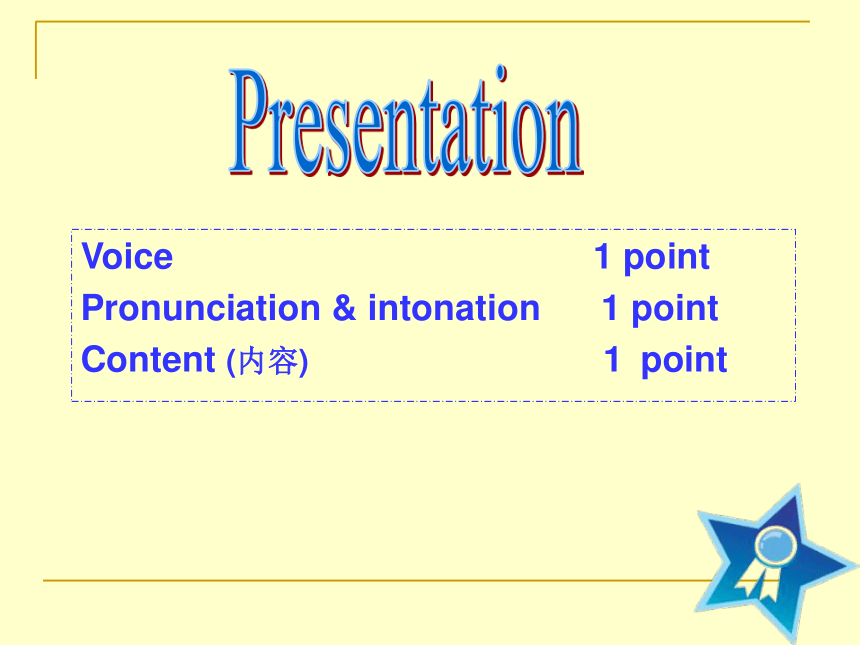

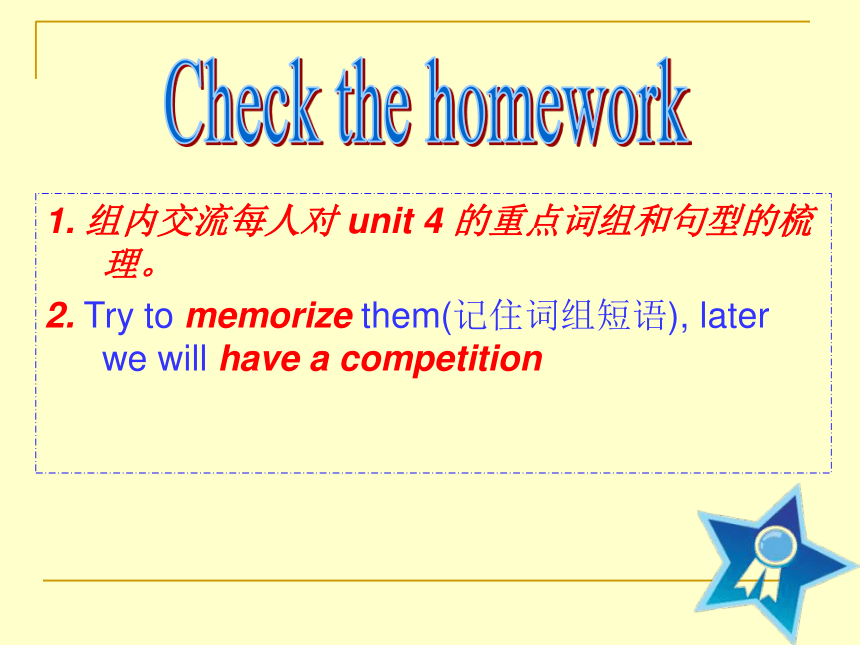
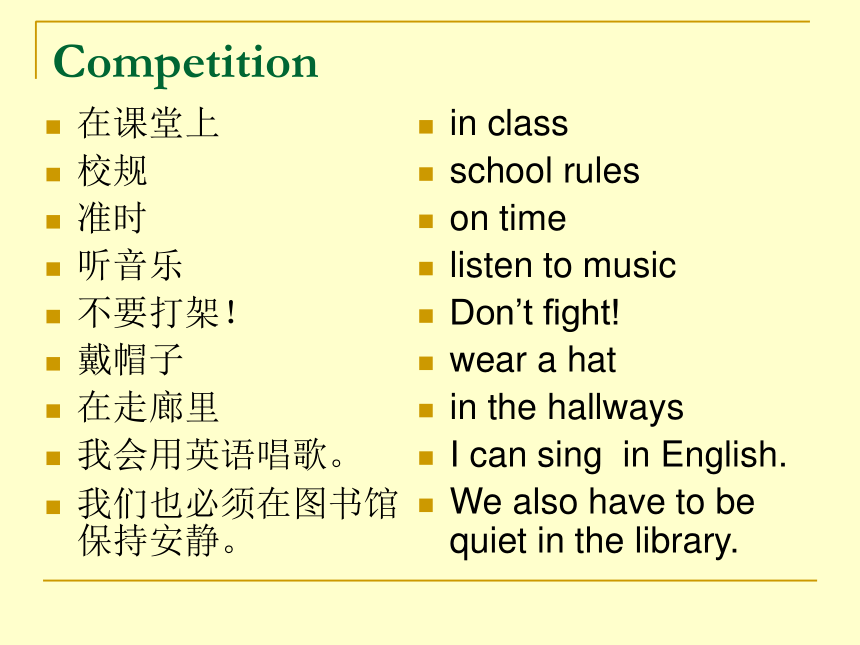
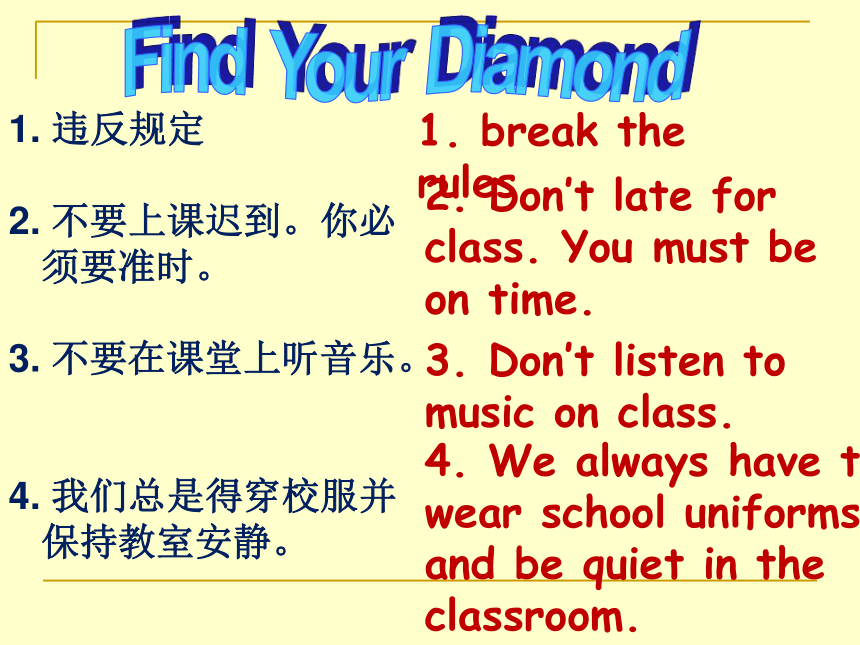
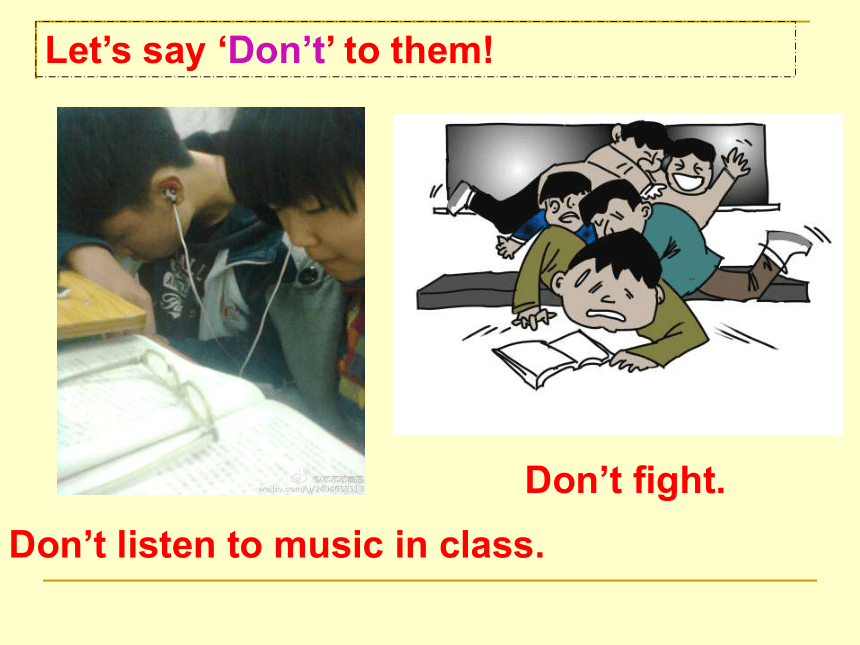
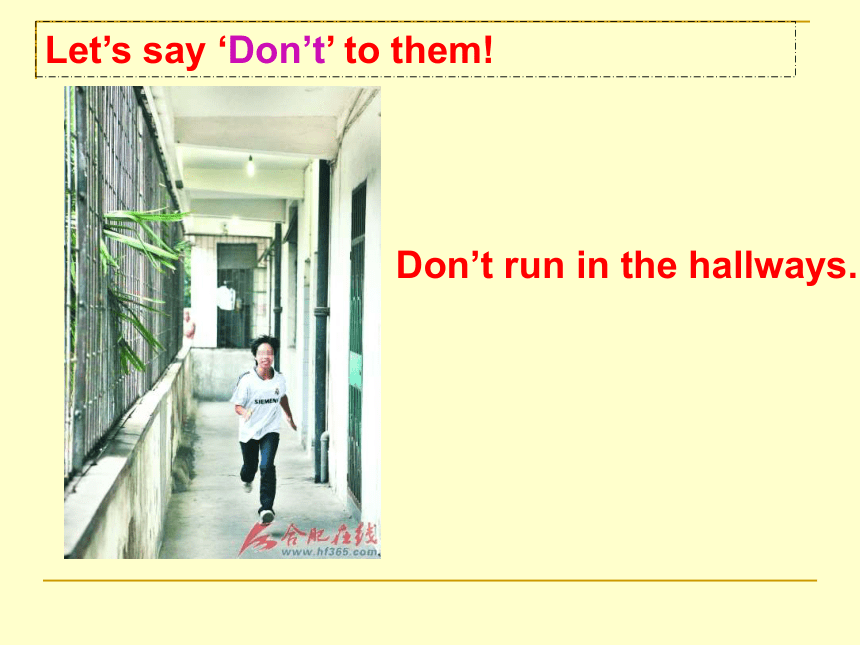
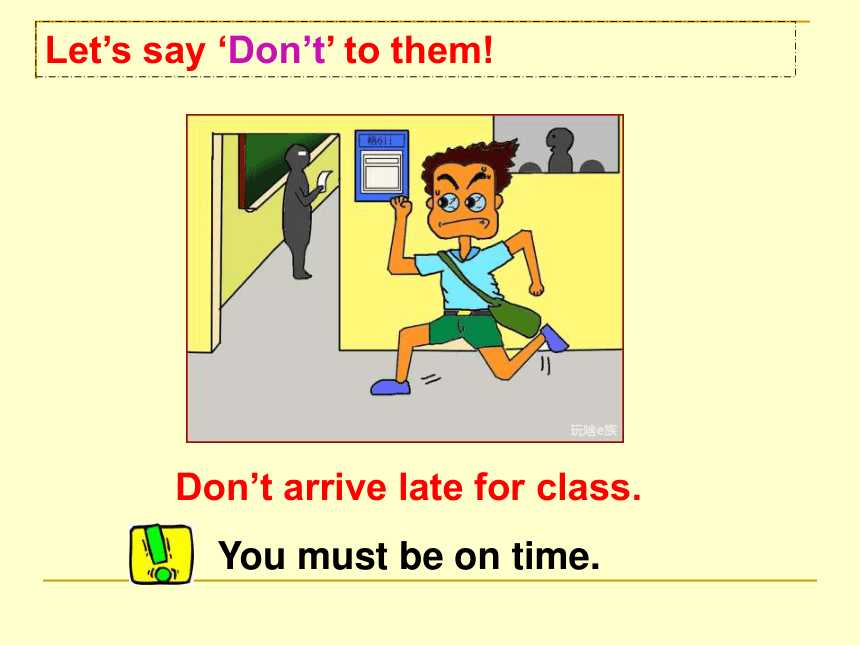
文档简介
(共22张PPT)
Voice
1
point
Pronunciation
&
intonation
1
point
Content
(内容)
1
point
Make
up
rules
for
your
dream
school.
为你理想的校园制定校规。
1.
组内交流每人对
unit
4
的重点词组和句型的梳理。
2.
Try
to
memorize
them(记住词组短语),
later
we
will
have
a
competition
Competition
在课堂上
校规
准时
听音乐
不要打架!
戴帽子
在走廊里
我会用英语唱歌。
我们也必须在图书馆保持安静。
in
class
school
rules
on
time
listen
to
music
Don’t
fight!
wear
a
hat
in
the
hallways
I
can
sing
in
English.
We
also
have
to
be
quiet
in
the
library.
违反规定
2.
不要上课迟到。你必须要准时。
3.
不要在课堂上听音乐。
4.
我们总是得穿校服并保持教室安静。
1.
break
the
rules
2.
Don’t
late
for
class.
You
must
be
on
time.
3.
Don’t
listen
to
music
on
class.
4.
We
always
have
to
wear
school
uniforms
and
be
quiet
in
the
classroom.
Let’s
say
‘Don’t’
to
them!
Don’t
listen
to
music
in
class.
Don’t
fight.
Let’s
say
‘Don’t’
to
them!
Don’t
run
in
the
hallways.
Don’t
arrive
late
for
class.
You
must
be
on
time.
Let’s
say
‘Don’t’
to
them!
Don’t
eat
in
the
classroom.
You
must
eat
in
the
dining
hall.
Let’s
say
‘Don’t’
to
them!
Listening
practice
Now
three
students
are
breaking
the
rules,
they
are
Peter,
Amy
and
Mike.
Listen
and
discuss
what
rules
are
they
breaking?
Pair
work
1
Sample:
A:
What
rule
is
Peter/
Amy/
Mike
breaking?
B:
He
is
running
in
the
hallway.
Pair
work
2
Sample:
A:
What
are
the
rules?
B:
We
can’t
run
in
the
hallways.
We
can’t
listen
to
music
in
class.
We
can’t
fight.
We
can’t
arrive
late
for
class.
We
must
be
on
time.
We
can’t
eat
in
the
classroom.
We
must
eat
in
the
dining
hall.
Language
points
(2d)
1.
important
adj.
重要的
The
school
rules
are
very
important.
2.
bring…to…把……带到……
We
can’t
bring
music
players
to
the
library.
Please
bring
your
notebook
to
school
tomorrow.
Translate:
我们不能把手机带到学校。
We
can’t
bring
our
mobile
phones
to
school.
3.
must
VS
have
to
must:
必须
We
must
be
on
time.
have
to
:
不得不
We
have
to
be
quiet
in
the
library.
Tips:
两者意义很接近,有时可以互换。
如:
We
have
to/must
follow
the
school
rules.
不同点:must
通常表示说话人的主观看
法,语气比较强烈。
have
to
往往强调客观需要。
如:We
must
go
to
school
on
time.
It’s
a
little
late
and
I
have
to
go
now.
Language
points
Make
questions
about
rules
according
to
the
conversation.
(2d)
Sample
1:
Q:
Does
Alice
have
to
wear
the
school
uniform?
A:
Yes,
he
does.
Sample
2:
Q:
can
John
bring
his
music
player
to
school?
A:
No,
he
can’t.
How
many
ways
can
we
use
to
make
rules
for
different
places?
Thinking
…
Grammar
Focus
1.
祈使句
(1)肯定祈使句
Sit
down,
please./
Come
in,
please./
Open
the
door.
(2)否定祈使句
Don’t
sit
down./
Don’t
come
in./
Don’t
eat
in
class.
祈使句:a.
表示请求、命令、叮嘱、号召、劝告
b.
通常省略第二人称you
c.
开头用动词原形
Look
out!
小心!
Wait
here
for
me!
在这等我!
Be
sure
to
come
here
on
time!
务必准时来到这里!
2.
情态动词can
的用法:
(1)表示能力
“会,能”:
Can
you
play
the
guitar?
Judy
can
speak
a
little
Chinese.
I
can
dance
and
sing.
(2)表示“允许,许可,可以”
Can
the
students
run
in
the
hallways?
We
can
eat
outside.
You
can’t
listen
to
music
in
class.
Grammar
Focus
3.
情态动词have
to
的用法:
(1)
肯定句:主语+have
to
+动词原形+其他
We
have
to
wear
sneakers
for
gym
class.
Tom
has
to
practice
the
guitar
every
day.
I
had
to
get
up
at
5:00
am
last
Monday.
(2)
否定句:主语+don’t
have
to+动词原形+其他
Nick
doesn’t
have
to
wear
a
uniform.
We
don’t
have
to
do
our
homework
at
once.
(3)
疑问句:Do/Does+主语+have
to+动词原形+其他
Do
you
have
to
stay
at
home
on
weekends?
---Yes,
I
do./
No,
I
don’t.
Does
Jim
have
to
get
up
early
tomorrow
morning?
---Yes,
he
does./No,
he
doesn’t.
Grammar
Focus
What
are
the
school
rules
of
Shijiazhuang
Foreign
Language
School?
Thinking…
Homework:
Write
a
short
passage
to
describe
your
dream
school.
You
can
begin
like
this:
At
my
dream
school,
we
don’t
have
to
come
to
school
very
early.
We…(at
least
30-40
words.)
Voice
1
point
Pronunciation
&
intonation
1
point
Content
(内容)
1
point
Make
up
rules
for
your
dream
school.
为你理想的校园制定校规。
1.
组内交流每人对
unit
4
的重点词组和句型的梳理。
2.
Try
to
memorize
them(记住词组短语),
later
we
will
have
a
competition
Competition
在课堂上
校规
准时
听音乐
不要打架!
戴帽子
在走廊里
我会用英语唱歌。
我们也必须在图书馆保持安静。
in
class
school
rules
on
time
listen
to
music
Don’t
fight!
wear
a
hat
in
the
hallways
I
can
sing
in
English.
We
also
have
to
be
quiet
in
the
library.
违反规定
2.
不要上课迟到。你必须要准时。
3.
不要在课堂上听音乐。
4.
我们总是得穿校服并保持教室安静。
1.
break
the
rules
2.
Don’t
late
for
class.
You
must
be
on
time.
3.
Don’t
listen
to
music
on
class.
4.
We
always
have
to
wear
school
uniforms
and
be
quiet
in
the
classroom.
Let’s
say
‘Don’t’
to
them!
Don’t
listen
to
music
in
class.
Don’t
fight.
Let’s
say
‘Don’t’
to
them!
Don’t
run
in
the
hallways.
Don’t
arrive
late
for
class.
You
must
be
on
time.
Let’s
say
‘Don’t’
to
them!
Don’t
eat
in
the
classroom.
You
must
eat
in
the
dining
hall.
Let’s
say
‘Don’t’
to
them!
Listening
practice
Now
three
students
are
breaking
the
rules,
they
are
Peter,
Amy
and
Mike.
Listen
and
discuss
what
rules
are
they
breaking?
Pair
work
1
Sample:
A:
What
rule
is
Peter/
Amy/
Mike
breaking?
B:
He
is
running
in
the
hallway.
Pair
work
2
Sample:
A:
What
are
the
rules?
B:
We
can’t
run
in
the
hallways.
We
can’t
listen
to
music
in
class.
We
can’t
fight.
We
can’t
arrive
late
for
class.
We
must
be
on
time.
We
can’t
eat
in
the
classroom.
We
must
eat
in
the
dining
hall.
Language
points
(2d)
1.
important
adj.
重要的
The
school
rules
are
very
important.
2.
bring…to…把……带到……
We
can’t
bring
music
players
to
the
library.
Please
bring
your
notebook
to
school
tomorrow.
Translate:
我们不能把手机带到学校。
We
can’t
bring
our
mobile
phones
to
school.
3.
must
VS
have
to
must:
必须
We
must
be
on
time.
have
to
:
不得不
We
have
to
be
quiet
in
the
library.
Tips:
两者意义很接近,有时可以互换。
如:
We
have
to/must
follow
the
school
rules.
不同点:must
通常表示说话人的主观看
法,语气比较强烈。
have
to
往往强调客观需要。
如:We
must
go
to
school
on
time.
It’s
a
little
late
and
I
have
to
go
now.
Language
points
Make
questions
about
rules
according
to
the
conversation.
(2d)
Sample
1:
Q:
Does
Alice
have
to
wear
the
school
uniform?
A:
Yes,
he
does.
Sample
2:
Q:
can
John
bring
his
music
player
to
school?
A:
No,
he
can’t.
How
many
ways
can
we
use
to
make
rules
for
different
places?
Thinking
…
Grammar
Focus
1.
祈使句
(1)肯定祈使句
Sit
down,
please./
Come
in,
please./
Open
the
door.
(2)否定祈使句
Don’t
sit
down./
Don’t
come
in./
Don’t
eat
in
class.
祈使句:a.
表示请求、命令、叮嘱、号召、劝告
b.
通常省略第二人称you
c.
开头用动词原形
Look
out!
小心!
Wait
here
for
me!
在这等我!
Be
sure
to
come
here
on
time!
务必准时来到这里!
2.
情态动词can
的用法:
(1)表示能力
“会,能”:
Can
you
play
the
guitar?
Judy
can
speak
a
little
Chinese.
I
can
dance
and
sing.
(2)表示“允许,许可,可以”
Can
the
students
run
in
the
hallways?
We
can
eat
outside.
You
can’t
listen
to
music
in
class.
Grammar
Focus
3.
情态动词have
to
的用法:
(1)
肯定句:主语+have
to
+动词原形+其他
We
have
to
wear
sneakers
for
gym
class.
Tom
has
to
practice
the
guitar
every
day.
I
had
to
get
up
at
5:00
am
last
Monday.
(2)
否定句:主语+don’t
have
to+动词原形+其他
Nick
doesn’t
have
to
wear
a
uniform.
We
don’t
have
to
do
our
homework
at
once.
(3)
疑问句:Do/Does+主语+have
to+动词原形+其他
Do
you
have
to
stay
at
home
on
weekends?
---Yes,
I
do./
No,
I
don’t.
Does
Jim
have
to
get
up
early
tomorrow
morning?
---Yes,
he
does./No,
he
doesn’t.
Grammar
Focus
What
are
the
school
rules
of
Shijiazhuang
Foreign
Language
School?
Thinking…
Homework:
Write
a
short
passage
to
describe
your
dream
school.
You
can
begin
like
this:
At
my
dream
school,
we
don’t
have
to
come
to
school
very
early.
We…(at
least
30-40
words.)
同课章节目录
- Unit 1 What's the matter?
- Section A
- Section B
- Unit 2 I'll help to clean up the city parks.
- Section A
- Section B
- Unit 3 Could you please clean your room?
- Section A
- Section B
- Unit 4 Why don't you talk to your parents?
- Section A
- Section B
- Unit 5 What were you doing when the rainstorm came
- Section A
- Section B
- Review of Units 1-5
- Unit 6 An old man tried to move the mountains.
- Section A
- Section B
- Unit 7 What's the highest mountain in the world?
- Section A
- Section B
- Unit 8 Have you read Treasure Island yet?
- Section A
- Section B
- Unit 9 Have you ever been to a museum?
- Section A
- Section B
- Unit 10 I've had this bike for three years.
- Section A
- Section B
